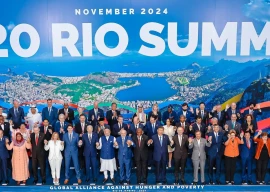
"We're working hard," Kerry said, "and we hope we're making careful progress, but we have big gaps, we still have some serious gaps, which we're working to close."
Speaking as he met German counterpart Frank-Walter Steinmeier, Kerry said he would "not say anything substantive about the discussions while they're going on, but a lot of serious work is going on by a lot of people."
Kerry, who on Friday postponed a trip to Paris to remain in Vienna, was due to meet Iranian Foreign Minister Mohammad Javad Zarif on Saturday afternoon, their fourth meeting in three days.
Steinmeier, arriving in the Austrian capital earlier Saturday, said that the final weekend of talks, after months of negotiations, was a "moment of truth".
At stake is a historic deal in which Iran would curb its nuclear activities in exchange for broad relief from years of heavy international economic sanctions.
It could end a 12-year standoff with the West that has even raised the threat of Israeli military strikes against Iranian nuclear facilities.
"The gap remains big... There now needs to be a political decision," an Iranian source told AFP on condition of anonymity, putting the onus on the world powers to make concessions.
The differences were such that Britain and Iran have raised the possibility, as expected by many analysts, that a final deal would not be reached by Monday's deadline, and that the negotiations could be extended.
Kerry said in Paris this week that no such extension, which could include a new interim deal, was being discussed. An earlier one was extended in July by four months.
The United States, Russia, China, Britain, France and Germany have been locked in talks with Iran since February to turn an interim accord reached a year ago into a lasting agreement by November 24.
Such a deal is aimed at easing fears that Tehran will develop nuclear weapons under the guise of its civilian activities.
The Islamic Republic hotly denies such an aim and insists its programme is entirely peaceful.
A source close to the Iranian delegation told AFP the negotiators aimed for something short of a comprehensive nuclear agreement, seeking instead a deal on "a general framework" whose details would be filled in later.
"There is no other scenario possible at this stage," the source added.
British Foreign Secretary Philip Hammond and his French counterpart Laurent Fabius also joined the talks on Friday. Both have since left but were expected to return.
It was unclear when or whether Russian Foreign Minister Sergei Lavrov, a key player in the talks, might also arrive.
Earlier this week the head of the Russian delegation said Lavrov would come only if there was serious progress.
Lavrov said from Moscow on Friday that "all the elements are already on the table" for a deal and that all that was missing was "political will".
Kerry on Friday "updated" Lavrov by phone. Kerry has also talked with the foreign ministers of several Gulf states and with those of Turkey and Canada, aides said.
Some areas under discussion appear provisionally settled in what would be a highly complex deal that would run for many years, even decades.
But two key issues remain: enrichment, a process that renders uranium suitable for peaceful uses but also, at high purities, for a weapon; and the pace of the lifting of sanctions.
Iran wants to massively ramp up the number of enrichment centrifuges, in order, it says, to make fuel for a fleet of future reactors, while the West wants them dramatically reduced.
COMMENTS (1)
Comments are moderated and generally will be posted if they are on-topic and not abusive.
For more information, please see our Comments FAQ
1732434981-0/BeFunky-collage-(10)1732434981-0-405x300.webp)




1732425487-0/BeFunk_§_]__-(42)1732425487-0.jpg)
1732428810-0/Copy-of-Untitled-(3)1732428810-0-270x192.webp)










Both Iran and USA are trapped into a quagmire - If the negotiations fail - the Obama will lose the opportunity to claim victory of diplomacy over war - on the other hand - Iranian hardliners will say to their current administration 'we told you its a waste of time'.